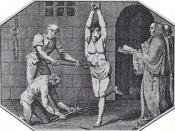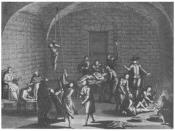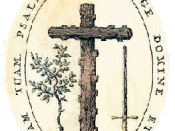The Inquisition was a religious movement to find and give punishment to heretics . The word inquisition comes from the word inquisitio, or inquest. The word inquisitio refers to the legal process that named the tribunals. It involved finding and interrogating suspects of crimes under oath to tell the truth. Some would condemn themselves. This method of finding heretics worked very well with the Waldensians and the Cathars. In France, the Templars were persecuted by the Inquisitors.
In the year 392 A.D. the Roman Emperor Thodosius I outlawed every religion that was not Christian or Jewish. After he declared that, heresy became not only a religious offense, but also a civil one. Heretics began revolting quite frequently in the eleven and twelve hundreds, so the Church took over the job of finding and punishing heretics. In 1231, a special court was created by Pope Gregory IV to demand that all heretics become Christians.
The Congregation of the Holy Office took control of the Inquisition in 1542. The judges for the Inquisition were almost all Dominican and Franciscan friars. The Inquisition took place mostly in Germany, France, Italy, and Spain. It did take place in other countries, but not as commonly. The investigations were in secret and almost all of the inquisitors abused their powers. Most Inquisitors were Dominican monks, appointed by the head of the Inquisition. Inquisitors and judges of the Inquisition could be compared to the prosecutors and judges of today's courts, to use an analogy. The inquisitor-general would appoint tribunals. Tribunals are groups of inquisitors.
During an inquisition, two inquisitors, who traveled together, would call out to a town, city, or village for confessions. Only males under age fourteen and females under age twelve would not be considered as heretics. Questions would be asked of those accused in...


